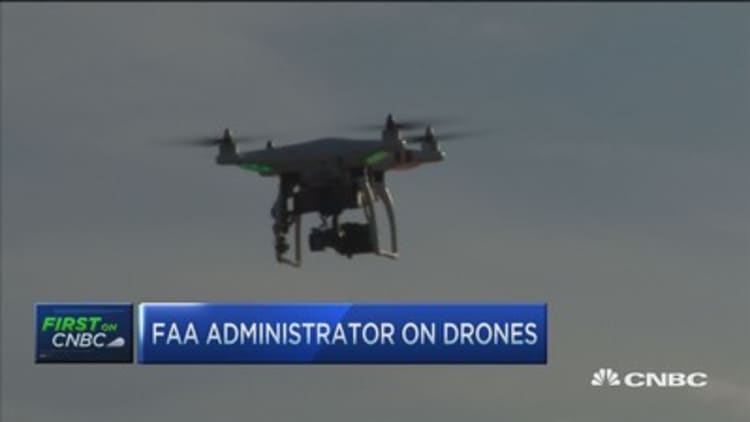Imagine this: You're diving with a group of friends when you begin to have difficulty breathing and feel a crushing pressure on your chest. You can't swim, and you definitely won't make it back to safety on your own.
The accident has been reported, and the closest emergency service center dispatches a drone. Your drone flies by, drops a flotation device down to you and signals your location back to the team of rescuers. The drone also instructs your friends how to perform CPR, and explains other emergency procedures.
This is the future of emergency medical services, if Google has anything to say about it.
Read MoreGoogle tests airborne drones to deliver goods
The Internet search giant received a patent last week to provide emergency medical services using unmanned aerial vehicles.
According to Google's U.S. Patent and Trademark Office (USPTO) filing, drone models vary from ones that include a video or audio file with instructions for providing medical support to ones that transport items that aid in diagnosing or treating a person who needs medical assistance.
Items include an EpiPen, a flotation device, an oxygen-therapy system, an EKG sensor, a first-aid kit and similar items.

Google was reported to be testing airborne drones to deliver goods ranging from candy to medicine in August, and the patent is the first time there has been clear information on what Google's services would look like. The patent, which was filed in December 2012, is limited to providing medical services only.
Google isn't the first company to experiment with practical applications for drones beyond recreational uses. Amazon was awarded a patent in May for a drone delivery program, including how the unmanned aircraft would communicate with each other and navigate the best route on their own.
Read MoreAmazon's drones could follow you to work
However, winning a patent does not mean the Google's drone medical service program will play out exactly as stated. The company faces many regulatory hurdles from the Federal Aviation Administration and similar government regulators around the world before turning its program into a reality.
Jessica Groopman, an analyst at the Altimeter Group in San Francisco, said unlike some other companies with plans for consumer delivery, Google's plan seems practical.
"The greater difference is what's the point, and what does it mean for me as a consumer? Is it creepy?" Groopman said. "Do we want drones to be flying over our house and delivering items? Or do we want them to save our lives?"
Read More GoPro jumps into virtual reality and drones
Groopman also said that Google's patent could give drone delivery services more mainstream acceptance.
"It's one thing to deliver medical products and services, but then it's easy to say 'Well, you let us deliver this, so why can't we deliver this," Groopman said.
A Google spokesperson said: "We hold patents on a variety of ideas— some of those ideas later mature into real products or services, some don't. Prospective product announcements should not necessarily be inferred from our patents."


